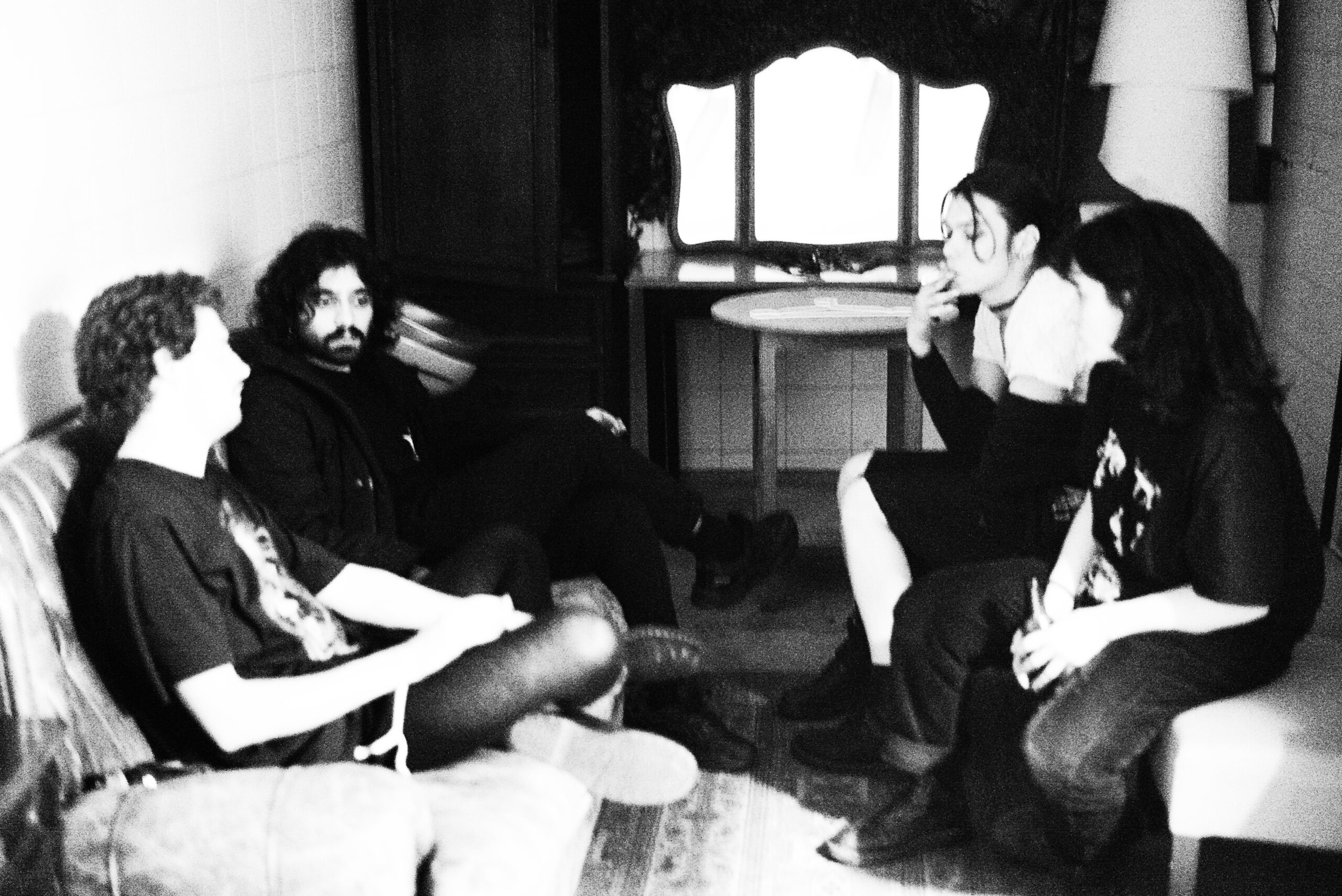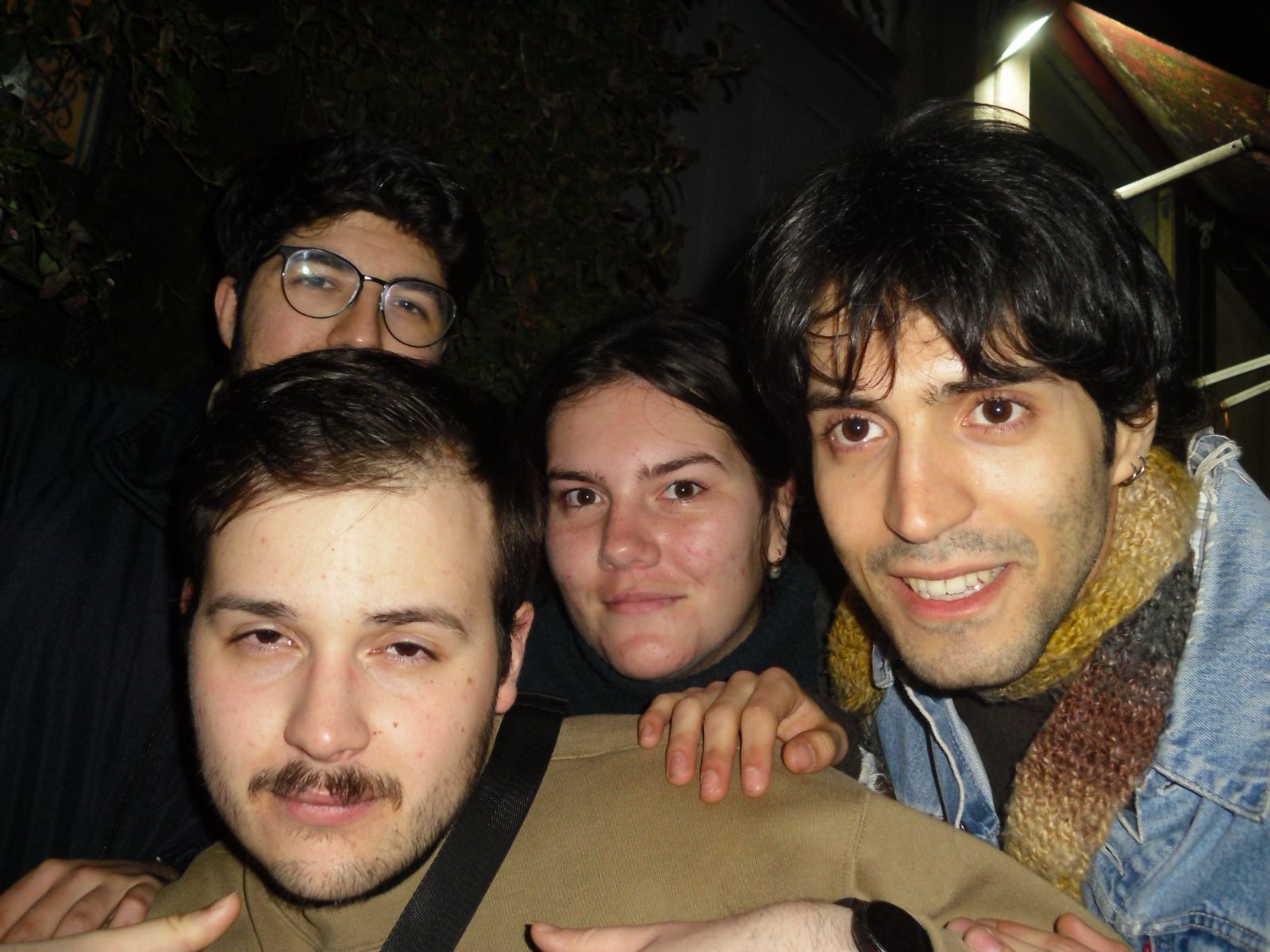
Tisiphone in interview: “Tisiphone is sort of a butterfly, too”
Tisiphone in interview: “Tisiphone is sort of a butterfly, too”

Tisiphone in interview: “Tisiphone is sort of a butterfly, too”
The full interview can be found below.
How did you meet, and what made you form Tisiphone? Was it related to the culture of your town, and/or other ideologies?
Clara: Léonard and Suzanne, they met each other ten years ago.
Léo: Yes, In the conservatory of music, Music School in Lyon (Conservatoire de Lyon).
Clara: They were friends before I met Léo, in the drummer school. We were friends and they were playing music already. We wanted just to make a band together.
Léo: We were on a collocation together, and Clara…
Clara: We were hanging around together and…
Léo: … and in my room, there was a drum. But nobody was playing the drum, but forgot, we make a band with this drum.
Clara: We were watching Twin Peaks, the series, and listening to The Cure (like the Pornography album) and Joy Division, kind of post-punk/coldwave/stag music. We were together most of the time so, we wanted to make a band, or so, individually.
By the way, I know this is trivial, but how did you come up with the name?
Clara: Tisiphone is one of the tree furies – the Erenyes – of the greek mythology. You have Tisiphone (which is one of the revenge), Alecto and Megaera and they basically are not really gods, but they were punishing people who were making evil. And like they were invisible to people, they were making hell, punishing the people who made evil stuff.
Léo: And, it’s sort of a butterfly, too, Tisiphone.
This is a trivial question too, but I want to know where do you find inspiration to write new songs?
Clara: Like, first, we said: “huh, let’s make a band together, let’s make coldwave together”, you know, but we were look like a fan of it, or like really just in to it, like they do also classical music. We are listening to really old types of music, we love rock, jazz, classical, but is true that we wanted to make this band around this coldwave thing, post-punk. It was also an aesthetic style that we loved.
Léo: Aesthetic sad, dark, romantic or… trance.
Clara: We wanted to make this all mixed, but the idea to make a coldwave band, once we weren’t into it, because we didn’t know really the codes of coldwave, the sentences…
Léo: We are not gothic…
Susanne: I didn’t even know this.
Clara: … And we are also a bit (laughs).
I know you have just one album, but how do you compose your music? Do you have a structured process you can describe?
Clara: It just the three of us, yes, making music like in the jams.
Susanne: We also compose our lyrics.
Clara: It depends on the piece that we make but also the lyrics. For example, sometimes we just jam together and we like the music that we are making, like the ideas, or something with the guitar, something with the bass. Sometimes it’s also because of the lyrics that we wrote, or something, they keep a switch.
Susanne: whatever do you imagine this music and we just write a story about the music.
I don’t know how much attention you pay to press, but critics are typically discussing the record in a post-punk context. Do you guys see yourself as part of, say, any kind of post-punk or coldwave lineage?
Clara: That’s funny, because, that’s kind of a subject that we are always speaking off, because we don’t really want to be extreme in one type or another, because this is not us, to be just into it, or just into that. And to me, I feel like I’m part of this line but also in the other lines.
Susanne: The first album would be very different.
Clara: Actually, we like to move and to hear other things, we like to search, like in the laboratory, like. We make experiences, and it’s kind of always into what it could be, into this coldwave, it’s always here. Sometimes we input more distance with it, sometimes there is more rap, like that.
Looking back at your work: you started by releasing three singles in 2015 – “Empty Streets”, “Looking Down” and “Black Velvet” – that was later included in the first album. Do you still enjoy those first songs you released or do you prefer the new material?
Léo: Playing live allows to listen to new energy, so, for the moment, it’s always a pleasure to play both songs.
Clara: For me, it’s easier now to like them again, like they were fresh, because there are a fresh new ones.. and then you have this comparison of different things.
Léo: And we have not a lot of songs, for the moment, we compose better when we are not full of songs, so we are obliged to defend a song.
Have you ever collaborated with other artists? If not, do you plan to do it in a near future? With who?
Léo: No, we have no collaboration.
Clara: No, we have never collaborated… Hm.. David Bowie (laughs). Actually, it happened that we talked about that, like with whom we want to.
Maybe a collaboration with the bands of the festival?
Léo: We don’t really know the other bands.
Clara: Of course, I will discover it tonight.
You played live in Portugal for the first time in MONITOR, a mini-festival dedicated to postpunk and minimal wave, and you now have returned to play at Post-Punk Strikes Again. What are your thoughts on Portugal and its people?
Susanne: I don’t know Portugal, it’s the second time that I come but I think the audience is really cool, very pleasant and good listening…
Léo: And it was really crazy to come in Portugal last year because it was the first time, we are a young band, and it was the first time that we flew…
Clara: And playing so far from home it was an experience like we were running.
Léo: For us, it was crazy to feel the joy of the people.
Clara: Yes, that joy that we kind of gave to people, and then people gave to us, like so hot, so strong, like a fan environment. We are not used to it, at all.
Léo: And when Jorge said to us to came back: Yes, Ok. I hope tonight would be good too.
So, moving on to tonight’s show, can we expect to listen to new songs?
Clara: Yes.
Léo: Yes, but just one, because…
Clara: No, two!
Léo: Two? Oh yes, because each band play only 40 minutes.
Clara: So we have to make it fast, we cannot play all the songs, but two!
Clair Obscure or Joy Division?
Clara: Joy Division.
Susanne: I don’t know Clair Obscure.
Léo: Yeah.
Rephrasing the question, Television or Joy Division?
Léo: Televison? No, Joy Division!
If you had to recommend a band/artists to someone, which one would you recommend and why?
Clara: Tombouctou!
Léo: Lots of!
Clara: Tombouctou, is a band of Lyon, like us, kind of noise, rock-noise, anti-music thing really fucking good. It’s Tombouctou like the city in Africa (Tombuctu), and they are from Lyon, they are friends, and they are really good.
Susanne: Le Prince Harry!
Léo: Ah yeah, Le Prince Harry is a belgian artist…
Clara: …kind of really fast electronic-punk.
By the way, can you tell me some artists that have influenced your work?
Clara: Joy Division! Ah, this is like abusive I cannot say that.
Léo: Hmm, I don’t know… Hmm, personally, I like Drab Majesty.
Clara: I like Malaria! I’ve been listening to Malaria a lot! We have a lot, of course, but it’s true that when we make interviews, or when people ask us about it, it’s always a band that without thinking about it, it’s like: Malaria! Malaria it’s a band of the 80’s, just women… Berlin, post-punk, it’s really, really nice!
What’s your opinion regarding the digital era that the musical industry current lives in, and in which ways does it affect your path as a band?
Léo: It’s always a question of money.
Clara: I prefer to make people that buy our CD. I would prefer it physically if I had to choose.
Léo: We wanted to make a vinyl, but we have not the money to produce the vinyl.
Clara: And you cannot do it without internet, of course, all of this, cannot happen without internet, and digital.
What about the possibility of allowing your album to be preordered, while giving a prize – like a single – for the people who do it?
Susanne: Yeah, it’s nice.
Clara: Yes.
Léo: Sure! It must be a reflection at all of this question, all that you sell, the strategy… For instance, we love the free price, but…
Clara: .. but it’s started to be complicated for us to make it because we sold a lot of CD’s at free price and at one point we were like ok it’s good that people buy our CD and also, yeah, give 5 give whatever you want, but it’s true that… Well, I don’t want to be, I can’t assume to be a capitalist because it’s working, and, it’s also just to ask for support to our work. I think it’s ok to understand that, but I don’t want to be in this way, or sort of thinking that If you don’t have money you cannot listen or we cannot share to you at all.
Léo: And we have no help from a label, we do all the work, so, at the moment we are obliged to do so.
Susanne: We really have a sort of a label, but everything’s unmade, so it’s very slow to do the things. As we tell you, we have not a precise style, so it’s very hard to find a label who say, here, ok you are with us.
Ok, we are almost done. Which were the last concert you’ve seen and the last record you’ve listened to?
Léo: For me it’s Le Prince Harry, the CD. The concert…
Susanne: Le Prince Harry, yeah, I think it was mine too.
Clara: The thing is that I saw a concert really recently…
Susanne: ..yeah, we saw.
Clara: Like really not so famous, and I was like: fuck off, fucking really great, but I cannot remember, sorry.
Susanne: We saw a lot of concerts because we did a lot of concerts this last month, so it’s all mixed.
Clara: What did we saw? Sorry, we are not really remembering… Yeah, I don’t know let’s say hm…
Léo: There are also a band from Lyon, called PRATOS.
(after the interview)
Clara: oh I did remember a band I’ve been listening to a lot. It’s called Slint, they were an american math/post-rock band.
To conclude, do you have a date for the release of the new album?
Léo: No.
Clara: It will be out in the next year, but we don’t know exactly when because we want to take the time to make it good.
Susanne: We need to take the time to produce, just the three. We want to produce different things, from punk music, so maybe we have our CD really soon.
Do you want to add anything else?
Léo: Viva Portugal! Obrigado.






